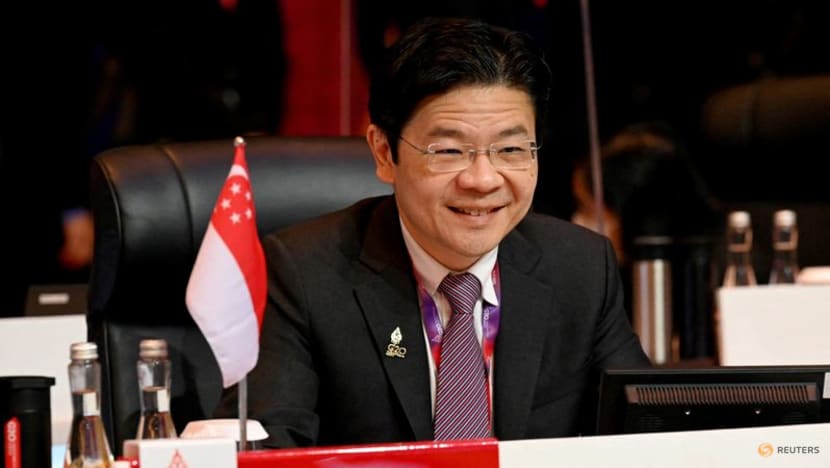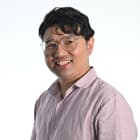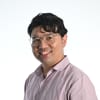Lawrence Wong recounts struggles and wins: From being a civil service 'quant' to PM

Singapore's Minister of Finance and Deputy Prime Minister Lawrence Wong attends the G20 Finance Ministers Meeting in Nusa Dua, Bali, Indonesia on Jul 16, 2022. (Photo: Reuters/Sonny Tumbelaka)

This audio is generated by an AI tool.
SINGAPORE: Although the ruling People's Action Party's (PAP) fourth generation (4G) leaders agreed back in 2022 that all of them stood a chance to become the next Prime Minister, Mr Lawrence Wong was still surprised to be picked by an overwhelming majority of his Cabinet colleagues.
Recounting the succession process after Mr Heng Swee Keat stepped aside as a 4G leader owing to age-related reasons, Mr Wong said his colleagues knew they had to be mentally prepared to succeed Prime Minister Lee Hsien Loong and bear the responsibility of leading the nation.
He said it was Mr Lee and former Cabinet minister Khaw Boon Wan who informed him at the end of the process that he was to become Mr Lee's successor.
“At that time, I was surprised and I went back home to tell my wife. She was surprised, too, but we had been prepared for it because she knew I was (a) part of this process,” said Mr Wong, who once said he never aspired for the top job.
Despite this, the Prime Minister-designate, who spent 14 years as a public servant before joining politics in 2011, said he saw being Prime Minister “still very much (as) a continuation in my mind of public service”, albeit at a larger scale and with heavier responsibility.
“So, it was a much bigger role. And I had to ask myself whether it was something I was prepared to do,” he said.
Mr Wong was speaking to the local media on Friday (May 10) in an interview at the National Press Centre, five days before he is to be sworn in as Singapore’s fourth Prime Minister on May 15.
During the hour-long session, he traced the steps of his political journey, recalled the struggles he faced in mastering languages, and set out his aspirations for future generations of Singaporeans.
Related:
THE "QUANT" THAT ALMOST LEFT PUBLIC SERVICE
Long before he entered politics, Mr Wong started off in public service as, in his words, a “quant” - someone who mainly did the number crunching and analysis work and was removed from direct policy-related work.
Mr Wong started as an economist at the Ministry of Trade and Industry in 1997. He later joined the Administrative Service in 2002 and was posted to the Finance Ministry.
Comparing himself to his schoolmates and peers outside of public service, he said: “I figured, I can do economics work in the government, I can do exactly the same kind of economics work in the private sector too and they are paying better.
“So, the thought did cross my mind. Maybe I should just leave and join the private sector, maybe a bank.”
His bosses advised that if he stayed, he may get exposure to other kinds of work, including policy work, which he might find more meaningful and interesting.
Mr Wong was referring to former Cabinet minister Khaw Boon Wan and former top civil servant Lim Siong Guan, who were then permanent secretaries for MTI and MOF respectively.
So he stayed, and soon Mr Wong became more involved in policy-related work, including going out into the community to explain Budget initiatives.
“And I found all of that very meaningful because that is the kind of work I would not have been able to do in the private sector. So I decided I did not have to leave. In fact, I did not want to leave,” he said.
When Prime Minister Lee invited him to enter politics in 2011, Mr Wong recalled saying that public service was his “calling” and he saw entering politics as a continuation of that.
About a decade and one COVID-19 pandemic later, it was time for the 4G leaders to pick a leader among themselves.
They decided to have someone to facilitate the process, get their views, select the best person for the job but also bring the team together. After the 4G team discussed with Mr Lee, Mr Khaw was roped in to facilitate the process.
“As he was going about the interviews, Boon Wan was very careful, he did not let on at all who might have emerged from the process. Not at all,” said Mr Wong, adding that this was why he and his wife were surprised by the result.
Mr Wong is married to Ms Loo Tze Lui, who was the vice-president of the Singapore’s Young Men’s Christian Association (YMCA). According to an archived version of her profile on the YMCA website, Ms Loo is a former banker.
“We had been prepared for it because she knew I was part of this process. And we knew that going into this we would accept the outcome of the process. And if this is the result, then I would step up and I would take on the responsibility,” he said.
“And that is why I am here, where I am now”.
THE SINGAPORE SYSTEM
Noting that Mr Wong came from a neighbourhood school background, a journalist asked him what that meant about the Singapore system and its social compact.
To this, Mr Wong said he was "a product of the Singapore system".
He said that the Singapore that its people want to see is one where every individual is provided with an opportunity to excel and maximise their potential, regardless of what their strengths or abilities may be or the paths they take.
“But to make this happen, we must have a system and a society where every job is respected, where there is fair pay for every job. And we recognise people for each of their contributions,” said Mr Wong.
Part of the Singapore compact is about giving a sense of assurance and security for Singaporeans that their “basics in life” will be taken care of even if they stumble or face setbacks, “so long as they work consistently”.
“And this assurance, this support, has to be provided not just by the government alone, but it also has to be something provided by all of us in society, so that we feel a sense of shared responsibility to one another, and we can grow as a more gracious, more generous, more big-hearted society,” he said.
BRUSHING UP ON MALAY AND MANDARIN
Mr Wong also spoke about the challenges he faced in communicating in other languages, including "struggling" in his mother tongue as a youth, and the progress he has made in mastering both Malay and Mandarin.
He said that Malay was something he had picked up conversationally since his civil service days and had given even more attention to since he entered politics.
“But now ever since the appointment as DPM - for close to two years now - I have been taking the lessons more seriously, too, because I do want to engage more in Malay, speak in Malay, so it is a continuing process,” he said.
“I think to be able to deliver a speech, it’s something I can do; to be fluent and be able to engage completely in Malay - I think that will be much, much harder,” he added.
Singapore's Prime Ministers have in the past delivered important speeches, such as the National Day Rally, in more than one language.
Mr Wong shared that he has also been continuing with his Mandarin lessons in recent years, albeit not as frequently as Malay ones as “I have had to bring up my Malay to a better level”.
“After all, I have studied Mandarin in school all my life and also struggled with studying Mandarin in school all of my life. But I have had the foundations with me,” he said.
“It is just that I did not have the benefit of growing up in a family environment where we spoke Mandarin regularly”.
He said he does not face much difficulty speaking to his residents in the language, but what remains is to become better at using Mandarin “at a higher level” for official work and in media interviews, he said.
HOPES FOR YOUNG SINGAPOREANS
Asked to address the post-Lee Kuan Yew generation of young Singaporeans who may not “fully appreciate” the nation’s progress thus far, Mr Wong said that Singapore’s development over the last 60 years is a “miracle” and “a transformation beyond anyone’s imagination”.
“The best chapters of the Singapore Story are yet to be written. And all of us, but especially the young generation … are going to be the authors of this next chapter,” he said.
“So, I would call on all of them to work with me and my team to write the next chapter together.”
On what he saw in young Singaporeans that keeps him hopeful for the future, Mr Wong said youths have a growing sense of Singaporean identity.
This was evident when the whole nation tackled the COVID-19 pandemic together, he said.
“(There were) young Singaporeans responding to the very difficult restrictions that we had to impose, but also doing their part to help their fellow Singaporeans."
Mr Wong added that young Singaporeans nowadays are more well-read and “certainly much more well informed than I was when I was their age". They are also clearer about what they would like to achieve in life.
The national Forward Singapore exercise had found that young Singaporeans want to go “beyond the 5Cs of the Singapore dream of the past”, referring to the materialistic goals of cash, car, credit card, condominium and country club.
Forward Singapore is a public consultation exercise launched in June 2022 by Mr Wong soon after he was appointed Deputy Prime Minister, aimed at "refreshing" Singapore's "social compact". The 16-month long consultation canvassed views of over 200,000 Singaporeans and stakeholders, culminating in a report released last October.
Mr Wong also noted how critics have misconstrued the findings as saying that Singaporeans today are unable to aspire to achieve such accomplishments anymore, which he said “is completely inaccurate”.
While he did not name the critics, a sociopolitical site Gutzy Asia published an editorial piece that said the results showed that young Singaporeans are moving away from materialistic goals as they are now harder to achieve in Singapore.
Disagreeing with this take, Mr Wong said the movement instead showed that youths do not want their life to be measured merely by “narrow metrics” and are instead in search for meaning and fulfilment, he said.
“I think these are very noble aspirations. And certainly, we will do our part in the Government to support these aspirations and help young Singaporeans to realise them."
This article was originally published in TODAY.




















